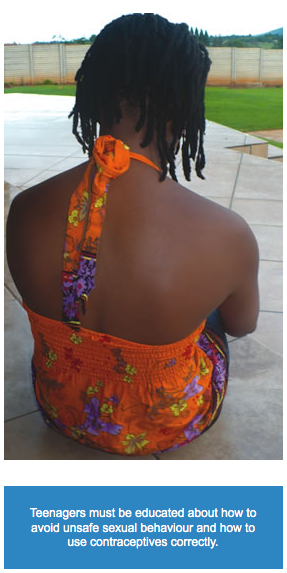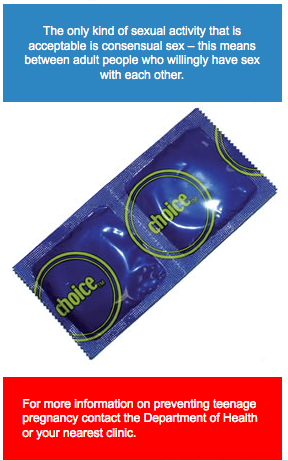Health Teenagers, sexuality and pregnancy
Health Teenagers, sexuality and pregnancy sadmin Most teenagers have a lot of questions about sex and sexuality and are unaware that their sexual development and behaviour have important health implications. Experimenting with sexual activity is a natural experience and often happens before a teenager is fully aware of how this might affect them. As teenagers grow and mature they are able to make better choices about relationships and it is strongly recommended that they don't rush into sexual activity too soon, but rather wait until they are more mature.
Most teenagers have a lot of questions about sex and sexuality and are unaware that their sexual development and behaviour have important health implications. Experimenting with sexual activity is a natural experience and often happens before a teenager is fully aware of how this might affect them. As teenagers grow and mature they are able to make better choices about relationships and it is strongly recommended that they don't rush into sexual activity too soon, but rather wait until they are more mature.
Teenage pregnancy
Teenagers should know that pregnancy is possible every time they have unprotected sexual intercourse, including the first time. Pregnancy in the teens can have serious health consequences for the mother and the baby. In South Africa it is reported that 66 out of every 1 000 pregnancies involve teenagers between the ages of 13 and 19. It is a known fact that teenagers are more likely to give birth to babies that are premature or sick. Pregnant teenagers usually drop out of school and many of them fail to complete their education. This leaves them with limited job opportunities which can result in poverty, increasing the burdens on themselves, their families and the community. Although some pregnant teenagers choose to have an abortion, this choice also carries risks.
Sexually transmitted infections (STIs) and HIV
Teenage sex exposes young girls to the risk of unwanted pregnancy, and it leaves youngsters vulnerable to contracting one or more of the many STIs, including HIV. The more sexual partners a teenager has and the younger they are when they indulge in sexual activity, the higher the risk of contracting an STI. Having one STI can make it easier to acquire other STIs at the same time. A person can have an STI without knowing it as there are often no noticeable signs or symptoms. All of the STIs can have serious consequences for future health. For example, a woman who gets an STI may have difficulty becoming pregnant later in life or may be more prone to developing certain types of cancer, such as cervical cancer. The use of condoms controls the spread of STIs.
Teenage pregnancy and HIV and AIDS
In South Africa the third-highest HIV infection rate occurs in young women between the ages of 15 and 25. Teenage pregnancy increases the risk of HIV infection and the virus is often passed on from the mother to the baby. This is called mother-to-child-transmission (MTCT). The Department of Health has made anti-retroviral drugs available to all pregnant women who test positive for HIV. These drugs have proved to be effective in preventing MTCT.
Teenagers and contraceptives
There are birth control methods (contraceptives) that can reduce the risk of pregnancy, but these do not reduce the risk of contracting an STI. The most successful method of protection against STIs is a condom. Contraceptive methods (other than abstinence) include pills, patches and injections. Healthcare providers will be able to give sexually active teenagers information and counselling on pregnancy and HIV transmission – this is called dual protection.
Sexual behaviour and health risks
-
 If a sex act is forced upon a person it is called rape. Rape is a very serious crime. Having sex with someone who is not sure they want to have sex can also be called rape.
If a sex act is forced upon a person it is called rape. Rape is a very serious crime. Having sex with someone who is not sure they want to have sex can also be called rape. - Teenagers sometimes get into difficult situations if they drink or use drugs and have sex. They may be lured into having sex and may be too drunk or high to know what they are doing. Later, the sex could be called rape.
- Teenagers may be lured into having sex with an adult. It is wrong for an adult to behave in this way, If an adult wants to engage in any type of sexual activity (kissing, petting, oral sex, intercourse) with a teenager or child, the teenager or child should report it to a parent, healthcare provider, law officer or other trusted adult at once.
Legal issues and pregnancy
Abortion (choice of termination of pregnancy) – Abortion, or choice of termination of pregnancy, means choosing to end the pregnancy, usually within the first three months (12 weeks) of pregnancy.
From the 13th week up to the 20th week of pregnancy there must be convincing reasons for terminating the pregnancy. These could include if the pregnancy resulted from rape o

r incest; if the pregnancy poses a serious risk to the mother or the baby; or if the pregnancy would significantly affect the social and economic circumstances of the mother.
Termination of pregnancy may only be done by a medical practitioner or a registered midwife who has completed the prescribed training. No parental consent is needed from the age of 12 years.
Contraceptives – you are legally allowed to obtain contraceptives, even those that require a prescription, without parental consent.
Statutory rape – sex with a person under the age of 16 (heterosexuals and homosexuals) is called statutory rape and is punishable with a sentence of up to six years in prison, with or without a fine of up to R12 000.
HIV testing – anyone over the age of 12 years or older may request an HIV test. Children under the age of 12 need parental consent to take an HIV test.
Marriage – no parental consent to get married is needed after the age of 18.
Adoption – if a baby is given up for adoption, legal papers authorising the adoption need to be signed. No parental consent is needed, irrespective of age.